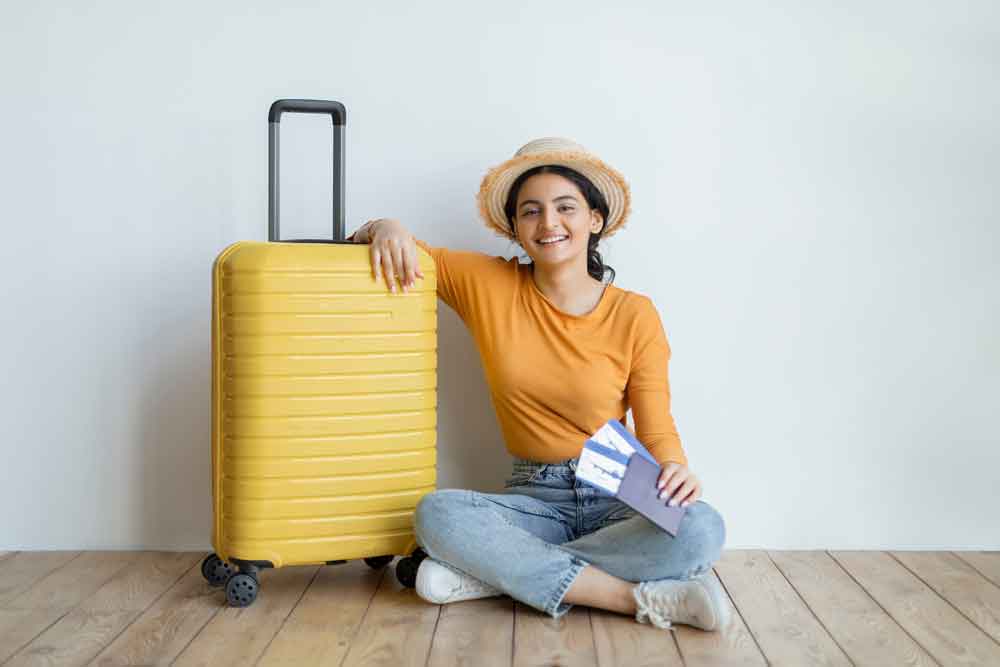American writer Rita Mae Brown said, ‘A woman who is free to roam the world alone is unstoppable.’ While this is true, travelling the world comes with certain expenses! It is important for women going overseas to make the most of their unique opportunities and experiences, while also budgeting cleverly. Here are some ways to ensure that.
Understand Currency Exchange
‘Keep monitoring exchange rates in the days leading up to your trip, and convert currency when it is at its lowest,’ says banker Fathima Adeeb. ‘Always use authorised agents or banks to avoid chances of fraud. Although credit cards are widely accepted everywhere, you’ll encounter fluctuations based on currency conversion rates. Instead, it might be prudent to get yourself a prepaid travel card, which locks in forex rates at the time you purchase it. If you’re visiting more than one country with differing currencies, consider multi-currency cards. In the event you use a credit card, always pay in the local currency, otherwise you may be subject to fees due to DCC or Dynamic Currency Conversion.’
Pro Tip: Do not convert your money at airports unless it is an emergency and you have no other option. The exchange rates are extremely unfavourable here. Don’t withdraw money from ATMs frequently as each withdrawal attracts a fee.
Plan In Advance
Financial planning is a pre-travel must, because it helps you set a realistic budget after you estimate your expenses. You have to factor in a number of things such as airfare, accommodation, food, transportation, activities, and even unforeseen emergencies. Besides this, limit yourself to a pre-decided daily spending allowance for little impromptu treats and shopping. While doing this, you have to research the destination country so that you’re aware of the costs involved. Carry enough money to cover all these costs, and a little extra. Carrying too much cash at once may not be a great idea, especially if you’re travelling to places where the crime rate is high. Instead, carry only necessary cash and use cards whenever possible. If you have a significant amount of cash, split it up and keep it in different places to avoid loss or theft altogether.
Pro Tip: Book your flights and hotels early for better rates. Don’t book off the first site you find, but compare various deals and inclusions before you zero in on your decision.
Be Budget-Friendly, But Safe
If you find that most hotels are out of your budget, consider guesthouses or platforms like Airbnb for more cost-effective options. Always check the location of your stay. It doesn’t make sense to compromise on a centrally-located accommodation for a small margin, if you’ll have to waste time and money commuting. Ensure your accommodation is safe for women and hygienic. Similarly, taxis in some countries can be prohibitively expensive. Research other transport options such as buses, trains, and tubes to save money and time. Find a place that’s close to one of these stations.
Pro Tip: Try to book places where both breakfast and Wi-Fi are included. This helps save both money and time. Join Loyalty Programmes for discounts, upgrades, and preferential rates. Most countries offer transportation passes for unlimited travel within a given duration. You can purchase these and get around in a stress-free manner.

Live Like A Local
Don’t look for overpriced comfort food when you travel. Instead, enjoy local and affordable dishes at hygienic street vendors, homestays, and local chains. If you’ve booked a service apartment with kitchen facilities, you can cook and pre-pack a meal to take along, and eat just one meal outside. It isn’t possible to cover everything in a short duration, so you may need to pick and choose attractions and activities. Mix and match free and low-cost attractions like museums and galleries. Some lesser-crowded places may always surprise you!
Pro Tip: If you’re craving a snack, shop for fresh fruit, dry fruit or other fresh produce at local markets. To get a sense of the city, join free walking tours and purchase tourist cards that offer bus tours and discounts. Support artisans and local businesses rather than overpriced brands to purchase souvenirs.
Other handy hacks:
1. If you’re at a hotel, use the safe to store your passports, extra cash, and important documents. Note down the address and phone number of your country’s Embassy as well as the local police in case of any financial theft or fraud.
2. Purchasing travel insurance may seem like an unnecessary expense, but get a basic policy that covers theft, damages and medical emergencies.
3. Wherever possible, carry reusable water bottles, filled up from the hotel or apartment. This will lessen your requirement to purchase mineral water.
4. Compare the costs of international roaming on your data provider, and a local provider from the destination country. Choose a sim card and phone connectivity accordingly.
5. Keep your shopping receipts to claim VAT refunds at the airport. Many countries offer these to tourists.
6. Use apps to keep track of your spending. Once you return, analyse your spending pattern and make notes to see how you can manage your expenses more efficiently for future trips.